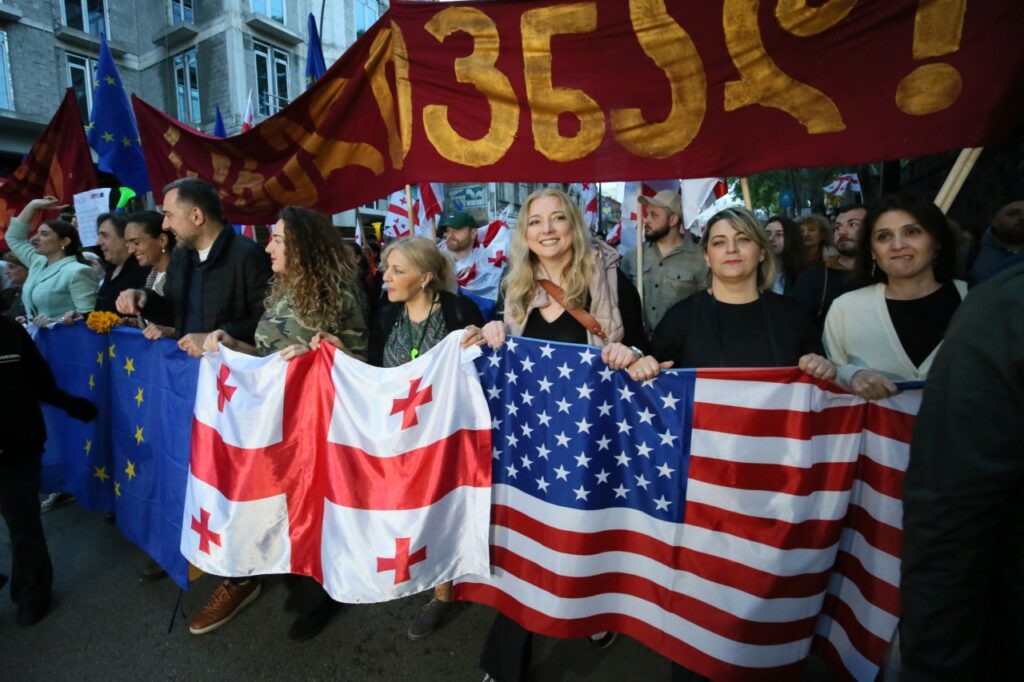Sofiko Megrelidze, The Associated Press
30 minutes ago

Demonstrators carrying Georgian, EU and US flags rally during an opposition protest against a proposed foreign powers exclusion bill and Independence Day celebrations in downtown Tbilisi, Georgia, Sunday, May 26, 2024. The opposition has denounced the bill as a “Russian law” because Moscow has used similar legislation to crack down on independent media, nonprofits and activists critical of the Kremlin. (AP Photo/Zurab Tsertsvadze)
TBILISI, Georgia (AP) — A Georgian parliamentary committee on Monday rejected a presidential veto of a “foreign agents” bill that has sparked mass protests for weeks.
The move by parliament's justice committee sets the stage for a plenary vote on Tuesday to override President Salome Zourabichvili's veto of the bill, which Zourabichvichvili and other critics say would restrict press freedom and hinder Georgia's potential membership of the European Union.
The law would require media outlets and non-governmental organizations that get more than 20 percent of their budgets from abroad to register as “serving the interests of foreign powers,” a move critics have denounced as “Russian law,” saying it resembles measures pushed through by the Kremlin.
The ruling Georgian Dream party says the bill is needed to thwart harmful foreign powers it believes are trying to destabilise the South Caucasus nation of 3.7 million people.
“This is extremely important for Georgia,” Maka Bocholishvili, a ruling party lawmaker who heads parliament's EU integration committee, told The Associated Press.
She argued the bill should help make the country “stable and peaceful” and rejected opposition claims it was unfair to call it “Russia law.”
“I believe that if the objectives of this law are properly understood, no one will be able to prove why transparency is against European integration,” Bocholishvili said, adding that he hoped Georgia's Western allies would “more fully understand the necessity of this law for Georgia.”
President Zourabichvili vetoed the law on May 18 after lawmakers from Georgian Dream and its allies passed it in parliament. The coalition has enough votes in parliament to override a veto.
After the bill was passed by parliament, mass protests broke out in the capital, Tbilisi.
On Sunday, President Zourabisvili and Prime Minister Irakli Kobakhidze denounced each other in speeches at Georgia's Independence Day ceremony.
“With the spectre of Russia looming over us, cooperation and reconciliation with Europe is the true path to preserving and strengthening our independence and peace. Those who obstruct and undermine this path trample and undermine our country's peaceful and secure future and impede our path to becoming a full member of the free and democratic world,” Zourabishvili said.
Kobakhidze hit back, accusing Zourabishvili of betraying the country.
“Despite the existential crisis and numerous betrayals, including that of the Georgian president, it was the unity and rational measures of the people and the elected government that gave us the opportunity to maintain peace in the country over the past two years,” he said.
The European Union's foreign policy arm said the adoption of the law “will have a negative impact on Georgia's progress on its path to EU membership.” Critics say the law may have been pushed by Russia to thwart Georgia's potential further integration with the West.
US Secretary of State Antony Blinken announced on Thursday that travel sanctions would be imposed on Georgian officials “responsible for or complicit in undermining democracy in Georgia.”
“We remain hopeful that Georgia's leaders will reconsider the bill and take steps to advance the country's democracy and Euro-Atlantic vision,” he added.

